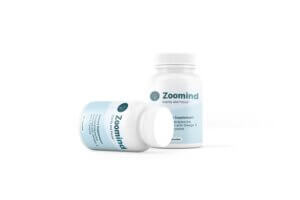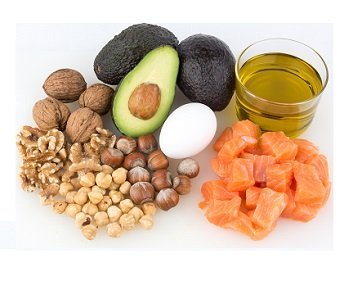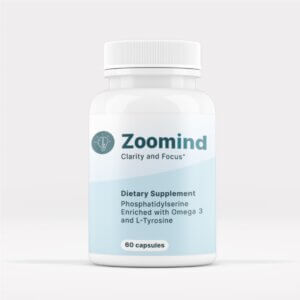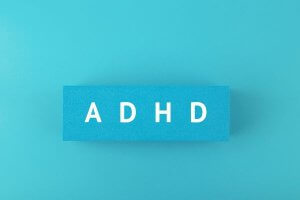Zoomind is a dietary supplement that contains a unique complex of phosphatidylserine, L-Tyrosine, and Omega-3, specially formulated to promote clarity and focus. Nutritional supplements are a gentle, natural way to optimize the body’s metabolism by providing the necessary lipids the brain needs for effective function. Zoomind comes in capsule form and has minimal known side effects or drug interactions, making it easy to add to your daily diet.

How is Zoomind beneficial to kids?
Attention Deficit Hyperactivity Disorder (ADHD) is a condition that mainly affects children from 6 years to young adulthood. Youngsters affected by this usually tend to exhibit unintentional inattentiveness, or hyperactivity and impulsivity.
ADHD is a universal problem that affects about seven percent of the population groups studied. In the past, most research into the treatments has focused on relieving symptoms by “repairing” the symptoms of the problem. The most commonly used drugs are stimulants, which act to increase the neurotransmitters that boost attention or dampen hyperactivity by acting as antidepressants and sedatives.
Studies have shown that modifications in the diet of children with ADHD, with particular emphasis on increasing omega-3 fatty acids, seem to be of most significant benefit. The American Psychiatric Association recommends that every diet (kids and adults) should include fatty fish, like salmon and tuna — two or more times a week. They also recommend that people with “impulse control disorders,” like attention deficit hyperactivity disorder (ADHD), supplement their daily diets with at least 1 gram of fish oil. The reason: Omega-3 fatty acids help brains function better.
There are very few side effects associated with taking an omega-3 supplement. However, as with all supplements, it’s always a good idea to speak with your treating doctor before giving your child an omega-3 supplement.
Omega-3 deficiencies are often associated with ADHD in children. Zoomind is rich in omega-3 fatty acids and phosphatidylserine both associated with boosting brain power.
Zoomind provides a pure source of essential fatty acids that the body needs for a wide variety of functions. Just about every aspect of neurotransmission — the movement of information from brain cell to brain cell — is affected by omega-3s. Our bodies can’t produce omega-3 fatty acids on its own. Zoomind is specially designed to boost the volume of omega-3 fatty acids to the body.
When Do Symptoms of ADHD Start to Show?

According to the American Academy of Pediatrics (AAP) guidelines, a proper diagnosis of ADHD can’t be given before the age of four. Up to that age, many kids are naturally active and impulsive. Most children aren’t checked for ADHD until they’ve reached school age, which in most countries is around 6.
ADHD can continue well into the teenage phase, and many people continue to show some of the symptoms in their adult years.
Who Suffers from ADHD?
ADHD is one of the most common neurodevelopmental conditions in children. It is a condition that causes a range of disruptive and hyperactive behaviors. Symptoms of ADHD often include lack of concentration, staying still and being organized.
There are significant variations in symptoms between boys and girls. This can affect the diagnosis. According to the published studies of the Centers for Disease Control and Prevention, boys are three times more likely than girls to be diagnosed with ADHD. This inequality is not necessarily because girls are less prone to the condition. Girls are more likely to have more subtle signs, and therefore, they are more challenging to identify.
What Causes ADHD?

The causes of ADHD are not yet totally understood, but it is believed to be a combination of factors, including:
Genetics – ADHD is often due to the genes you inherit from your parents. Research has shown that parents and siblings of a child with ADHD are more likely to have ADHD on their own, although it does not appear to be linked to a single genetic defect.
Function and structure of the brain, including several possible brain differences detected in people with ADHD compared to people without, although the exact meaning of these is unclear. For example, brain scans have shown that some areas of the brain in people with ADHD can vary in size, being either smaller or larger than average.
Most significantly, children with ADHD may have a chemical imbalance in the levels of neurotransmitters or how they function. Diet can strongly influence neurotransmission.
Some groups are especially vulnerable, such as children born prematurely, children who have epilepsy, and those whose brains did not develop fully in the womb.
One of the most important causes, which is often missed, is dietary deficiencies.
How Can Dietary Deficiency Contribute to ADHD?
Not eating the right foods or too little of some essential oils, vitamins, and minerals can contribute to symptoms of ADHD. The proper workings of the brain in the essential functions of cognition, memory and focus depend heavily on a type of neurotransmitter known as dopamine. Dopamine is a chemical messenger that itself is not present in anything we eat, our body has to make it directly out of our food intake so that our nervous system can use it to send messages between cells.
What are the Main Ingredients in Zoomind?
Zoomind contains Phosphatidylserine, Omega 3 fatty acids, and L-tyrosine.
PS (Phosphatidylserine), Omega-3 fatty acids, and L-Tyrosine have been studied for their potential benefits in managing ADHD symptoms. Here are some potential benefits and relevant references for each:
- Phosphatidylserine (PS):
- PS is a naturally occurring phospholipid found in high concentrations in brain cell membranes.
- Some studies suggest that PS supplementation may improve cognitive functions, attention, and behavior in individuals with ADHD.
- One study conducted by Hirayama et al. (2014) found that PS supplementation improved attention, impulsivity, and short-term auditory memory in children with ADHD. Reference: Hirayama S, et al. (2014). The effect of phosphatidylserine administration on memory and symptoms of attention-deficit hyperactivity disorder: a randomised, double-blind, placebo-controlled clinical trial. Journal of Human Nutrition and Dietetics, 27(4), 284-291.
- Omega-3 Fatty Acids:
- Omega-3 fatty acids, particularly eicosapentaenoic acid (EPA) and docosahexaenoic acid (DHA), are essential fats found in fish oil.
- Some studies suggest that omega-3 supplementation may have a positive impact on ADHD symptoms, such as inattention, hyperactivity, and impulsivity.
- One randomized controlled trial by Gustafsson et al. (2010) found that omega-3 supplementation improved attention and behavior in children with ADHD. Reference: Gustafsson PA, et al. (2010). Omega-3 fatty acids supplementation improves cognition and modifies brain activation in young children with attention deficit hyperactivity disorder. PLoS ONE, 5(11), e13917.
- L-Tyrosine:
- L-Tyrosine is an amino acid that is a precursor to dopamine, norepinephrine, and epinephrine, which are neurotransmitters involved in attention and mood regulation.
- Some studies suggest that L-Tyrosine supplementation may enhance cognitive performance and attention in stressful or demanding situations.
- One study conducted by Colzato et al. (2013) found that L-Tyrosine supplementation improved working memory performance in healthy adults under high-demanding conditions. Reference: Colzato LS, et al. (2013). Acute tyrosine supplementation improves working memory in older adults: evidence from a double-blind, placebo-controlled study. Neurobiology of Aging, 34(4), 1177-1187.
What is the Function of Zoomind?
Zoomind provides a source of essential chemicals that the body needs for a wide variety of functions. Zoomind is specifically designed to increase the volume of omega-3 fatty acids in the body. The body cannot manufacture omega-3 fatty acids on its own. It transfers them through the food or dietary supplements we consume.

Omega-3 boosts the body’s supply of dopamine, which is required in neurotransmission. Many prescription medicines for ADHD also try to target dopamine production, which is essential for the brain’s functions of cognition and memory.
Zoomind is a dietary supplement specifically designed to deliver lipid nutrients to help relieve the symptoms of ADHD. It is intended mainly to provide omega-3 fatty acids, whose deficiencies are often associated with ADHD in children.
How Does Zoomind Work?
Zoomind acts as a source of the two most important types of omega-3 fatty acids – eicosapentaenoic acid (EPA) and docosahexaenoic acid (DHA). Zoomind is a proprietary composition containing phosphatidylserine-omega-3 that is EPA enriched. EPA is most correlated with behavioral and mood improvement. Zoomind works as an innovative non-prescription clinical dietary therapy for reducing problems like ADHD. No addictive or aggressive drugs, no stimulants. Best of all, it’s safe and without side effects because Zoomind utilizes compounds familiar to the body.








